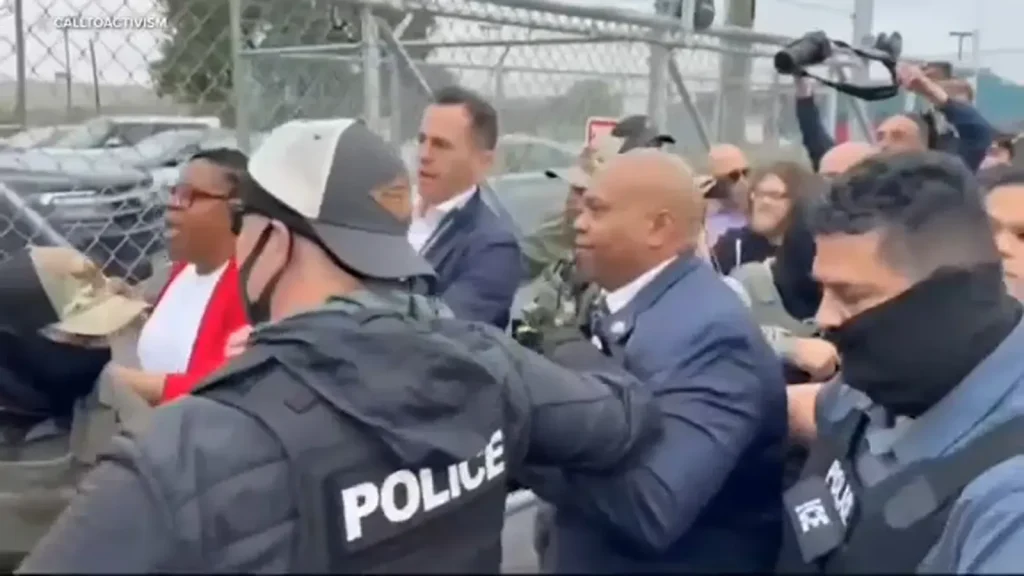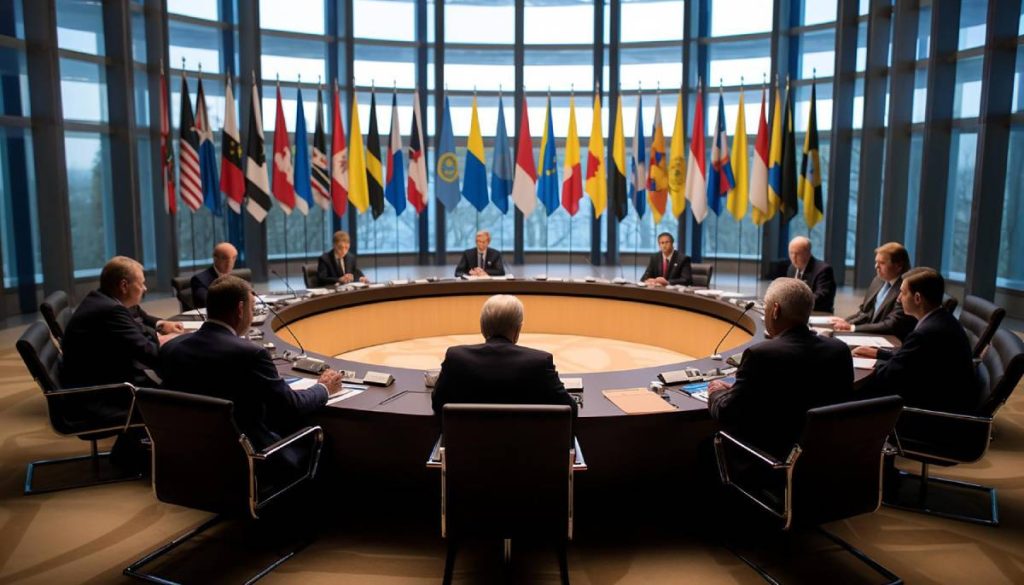The arrest of Newark Mayor Ras Baraka has sent shockwaves through both local and national political circles. On Friday, Baraka was detained at a federal immigration detention center, sparking discussions about the potential implications for New Jersey Democrats involved in the confrontation with authorities. The Trump administration has indicated that other elected officials, including Representatives Bonnie Watson Coleman, Rob Menendez, and LaMonica McIver, might also face charges stemming from the incident outside the Delaney Hall ICE facility. As details continue to emerge, the narrative surrounding this controversial event underscores growing tensions between local leadership and federal law enforcement. With ongoing discussions about immigration policies, this incident highlights a critical moment for New Jersey’s political landscape and raises questions about the balance of power between state and federal governments.
In a startling turn of events, the recent apprehension of Newark’s elected leader has ignited a firestorm of debate regarding the rights of lawmakers navigate federal policies. Ras Baraka’s detention at an immigration enforcement center speaks to a broader conflict between local governance and the authority of federal agencies under the Trump administration. As accusations mount against fellow New Jersey Democrats, such as Bonnie Watson Coleman and Rob Menendez, the intricacies of the event outside an ICE facility reveal the challenges political figures face when advocating for their constituents in the face of federal scrutiny. Furthermore, the evolving narrative of this incident raises pressing questions about the treatment of legislators during oversight functions at federal detention centers. The repercussions of these actions may well redefine the political discourse in New Jersey and beyond.
The Arrest of Ras Baraka: Details and Reactions
Ras Baraka, the Mayor of Newark, was arrested amidst a rising tension surrounding immigration policies in the United States. His arrest, which took place at the Delaney Hall ICE facility, quickly became a focal point for political discourse, especially among New Jersey Democrats. The incident not only raised questions about Baraka’s actions but also highlighted the larger issues of federal immigration enforcement under the Trump administration. Reactions from various political leaders were swift, with some expressing support for Baraka and others condemning his alleged trespassing.
Following the arrest, the surrounding circumstances became a hotly debated topic. The Trump administration indicated that Baraka’s actions, along with those of other Democratic lawmakers, could lead to further charges, a statement that struck a nerve within the New Jersey political landscape. Representatives Bonnie Watson Coleman, Rob Menendez, and LaMonica McIver firmly denounced the DHS’s version of events, stressing their legislative rights to oversee federal facilities. This incident has not only put Ras Baraka in the spotlight but also raised concerns over the political climate in the state, especially among New Jersey Democrats.
Political Fallout from the ICE Incident
The fallout from the clash at the Delaney Hall ICE detention center continues to reverberate through New Jersey’s political scene. With the Trump administration threatening charges against more Democratic officials, the incident reveals the intense conflict over immigration policy and federal authority. The three lawmakers present during the disturbance assert that they were merely fulfilling their duties to oversee governmental operations, emphasizing that the administration’s narrative is misleading. This situation showcases the heightened tensions between federal agents and elected officials, aptly reflecting the divisive nature of immigration enforcement in the current political climate.
As detailed by both Representative Menendez and Coleman, the pushback against the DHS’s characterization is emblematic of broader frustrations felt by many Democrats. The arrests and the ensuing statements have ignited discussions about the legality of such federal actions and the ramifications for local officials standing up against what they perceive as unjust policies. The political implications of Ras Baraka’s arrest and the administration’s aggressive positioning could have lasting effects, especially as New Jersey approaches critical elections where immigration remains a pivotal issue.
Implications for New Jersey Democratic Leadership
The arrest of Ras Baraka has significant implications for the leadership of the New Jersey Democratic Party. With Baraka’s gubernatorial aspirations in the air, this incident can be seen as a balancing act between standing firm against federal immigration policies and navigating the political fallout that arises from such confrontations. The public response to Baraka’s arrest is likely to influence voter sentiment as the party attempts to mobilize support amidst a turbulent backdrop of federal immigration policy under Trump.
Moreover, the stance taken by New Jersey Democrats following this incident could shape their future strategy against the Trump administration’s immigration enforcement measures. Several party leaders, including the arrested lawmakers, may face increased pressure to articulate a unified and compelling narrative that resonates with constituents who are either supporters of immigration reform or advocates for stricter enforcement. As the situation develops, local Democrats will need to leverage this incident not just for immediate political gain, but also as part of a broader ongoing campaign against federal policies perceived as hostile to immigrant communities.
Ras Baraka’s Future: Political Ally or Liability?
Ras Baraka’s political future now faces scrutiny following his arrest. As Newark’s mayor and a rising star among New Jersey Democrats, Baraka’s actions during the incident at the ICE facility could be perceived differently by voters. Will this incident solidify his status as a champion of immigrant rights, or will it haunt his ambition to serve as governor? The duality of being a political ally to those who oppose harsh immigration measures while potentially being labeled a liability by moderate voters poses a complex challenge for Baraka.
The ongoing dialogue around Baraka’s arrest speaks to the larger narrative of Democratic leadership navigating contentious issues. His strong stance against the Trump administration’s policies may galvanize support among progressive voters, yet it also risks alienating more conservative constituents wary of confrontations with federal agencies. As the political landscape evolves, it will be essential for Baraka to articulate a vision that reconciles these perspectives, ensuring that he resonates with the diverse population of New Jersey.
The Role of ICE in Newark and Community Backlash
The presence of ICE facilities in Newark has become a point of contention among local communities and advocates. The apprehension towards immigration enforcement is intensified by alarming reports of alleged misconduct by federal agents, heightening community fear and outrage. The clash that resulted in Ras Baraka’s arrest is indicative of the broader resistance against perceived federal overreach in immigration matters, reflecting a community determined to stand up against practices seen as unjust.
Local leaders, including Baraka, have often criticized ICE’s operations, claiming they disrupt the social fabric and instill fear among residents. This rhetoric finds support amid a backdrop of increasing activism from immigrant rights groups, who are rallying against the detention and deportation of undocumented individuals. As Newark’s South Ward continues to grapple with the effects of ICE’s presence, the dialogue around Baraka’s arrest may serve to strengthen local activism and a concerted effort toward immigration reform.
The Department of Homeland Security’s Response to the Incident
The Department of Homeland Security (DHS) has firmly positioned itself against the actions of Ras Baraka and the Democratic lawmakers involved in the incident outside the Delaney Hall ICE facility. DHS spokesperson Tricia McLaughlin’s statements emphasize the agency’s commitment to protecting its officers and asserting their authority in the face of perceived assaults by elected officials. This framing seeks to reinforce DHS’s narrative of lawfulness versus defiance regarding federal enforcement policies and highlights their unyielding stance in enforcing immigration laws.
The response from DHS marks a significant step in the escalating tensions between federal immigration enforcement and local government officials. The mention of body cam footage purportedly documenting the altercation serves as a claim to support their case against Baraka and his colleagues. As the agency continues to investigate the events surrounding the incident, the implications of DHS’s stance could see further legal repercussions not only for Baraka but for other Democratic leaders, adding to the already contentious environment surrounding immigration enforcement in America.
Public Response to Ras Baraka’s Arrest
Public sentiment regarding Ras Baraka’s arrest fluctuates widely, reflecting the deep divisions among voters on immigration policy. Supporters view Baraka as a heroic figure willing to stand up against federal overreach, portraying his actions as necessary for the protection of immigrant rights. In contrast, opponents argue that his actions undermine law enforcement and could put the community at risk. This dichotomy illustrates the complex landscape of public opinion where immigration policies dominate discourse, especially in urban settings like Newark.
The media coverage surrounding Baraka’s arrest has amplified these differing perspectives, allowing for a diverse range of opinions to surface across social platforms. As discussions unfold, more residents are engaging in conversations about the implications of such confrontations with ICE, suggesting a growing awareness and potential mobilization regarding immigration issues in New Jersey. The reactions to this incident could well illustrate the future trajectory of political activism for both immigrant rights and law enforcement accountability.
The Future of Immigration Policy in New Jersey
The Ras Baraka incident signals a critical moment for future immigration policy in New Jersey. As state lawmakers digest the implications of the confrontation with federal authorities, there lies an urgent necessity to rethink approaches to immigration that reflect the diverse values of New Jersey residents. Baraka’s arrest may spark renewed advocacy for comprehensive immigration reforms aimed at balancing legal enforcement with humanitarian considerations.
Local political leaders are tasked with not only supporting their constituents but also delineating a clear stance against the federal government’s more aggressive posture under the Trump administration. The dialogue surrounding Ras Baraka’s arrest could catalyze movements for policy changes that advocate for immigrant protections while maintaining respectful interactions with law enforcement. As debates heat up, New Jersey Democrats will likely have an opportunity to redefine their approach to immigration policy, calling for a suitable balance of accountability and compassion.
Legal Challenges and Potential Consequences for Elected Officials
The legal ramifications stemming from Ras Baraka’s arrest pose significant challenges for elected officials in New Jersey. The prospect of additional charges against members of Congress engaged in the Delaney Hall incident underscores the precarious position that lawmakers occupy when confronting federal enforcement. As the Trump administration takes a firm stance, local leaders may need to carefully navigate their actions to avoid legal repercussions while continuing to advocate for their constituents.
The ongoing legal discourse surrounding this incident will undoubtedly influence how Democratic representatives in New Jersey approach their interactions with federal authorities moving forward. The implications stretch beyond just the recent arrests; they also invite a critical examination into the rights members of Congress possess when it comes to oversight of federal facilities. As the situation unfolds, it remains to be seen how this legal scrutiny will redefine the standing of New Jersey’s political leaders, especially in the face of an evolving national immigration strategy.
Frequently Asked Questions
What led to Ras Baraka’s arrest at the ICE detention center?
Newark Mayor Ras Baraka was arrested for allegedly trespassing at the Delaney Hall ICE facility in Newark. The arrest occurred during a confrontation involving several New Jersey Democrats who were attempting to conduct oversight at the immigration detention center.
Are other New Jersey Democrats facing charges related to Ras Baraka’s arrest?
Yes, the Trump administration is considering criminal charges against three additional New Jersey Democrats—Rep. Bonnie Watson Coleman, Rep. Rob Menendez, and Rep. LaMonica McIver—who were involved in the confrontation at the ICE facility during which Mayor Ras Baraka was arrested.
How did the Trump administration respond to the incident involving Ras Baraka?
The Trump administration, through DHS spokesperson Tricia McLaughlin, indicated that they possess body camera footage of the incident and have described the actions of the involved Democrats as assaults against federal officers, implying that there may be more arrests beyond Ras Baraka’s.
What are the implications of Ras Baraka’s arrest for his political career?
Ras Baraka, who is currently running for governor of New Jersey, faces significant scrutiny following his arrest for trespassing at the ICE detention center. This incident may impact his campaign as it raises questions about his approach to immigration enforcement and federal law.
How have Democratic lawmakers responded to their portrayal in relation to Ras Baraka’s arrest?
Democratic lawmakers, including Rep. Rob Menendez and Rep. Bonnie Watson Coleman, have publicly rebutted the DHS’s claims regarding the incident, stating they were conducting lawful oversight at the detention center and denying any misconduct or assault on federal officers.
What specific charges was Ras Baraka facing after his arrest?
Ras Baraka was charged with one count of trespassing in federal court following his arrest at the ICE detention center. He was released without bond after the incident.
What evidence does the DHS claim to have regarding the incident with Ras Baraka?
The Department of Homeland Security claims to have body camera footage of the incident that allegedly shows members of Congress, including Mayor Ras Baraka, engaging in aggressive behavior toward ICE officers.
Why is the arrest of Ras Baraka significant for Newark and New Jersey politics?
The arrest of Ras Baraka is significant because it highlights tensions between local democratic leaders and the federal government regarding immigration policies. It also raises questions about political accountability and law enforcement in a context where state and federal priorities may clash.
| Key Point | Details |
|---|---|
| Ras Baraka Arrest | Newark Mayor Ras Baraka was arrested for allegedly trespassing at the Delaney Hall ICE facility. |
| Trump Administration’s Actions | The Trump administration indicated more Democratic politicians could face charges. |
| DHS’s Position | DHS claims to have evidence of lawmakers assaulting ICE officers. |
| Reaction from Lawmakers | Democratic lawmakers dispute the DHS’s portrayal, claiming they have legal rights to observe. |
| Future Implications | Potential for more arrests as indicated by DHS. |
| Baraka’s Release | Baraka was released without bond and charged with trespassing. |
Summary
The Ras Baraka arrest highlights the tensions surrounding immigration enforcement in the United States, especially in New Jersey. With the Trump administration considering charges against more Democratic lawmakers involved in the incident, the situation underlines a significant clash between federal immigration policy and local governance. Lawmakers are asserting their legal rights while facing severe allegations from the Department of Homeland Security, marking a controversial chapter in their ongoing political battles.



